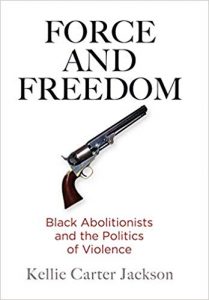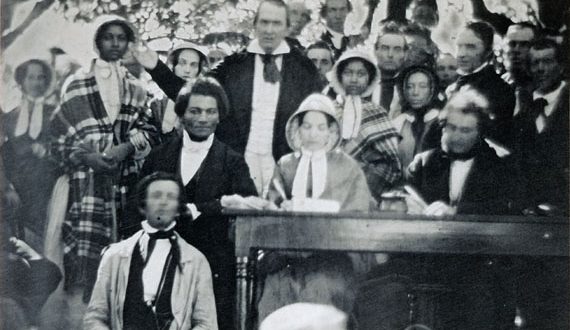Podcast: Play in new window | Download (Duration: 59:00 — 42.9MB)
 In the August 1897 Atlantic Monthly W. E. B. Du Bois published “Strivings of the Negro People” in which he introduced the term double-consciousness:
In the August 1897 Atlantic Monthly W. E. B. Du Bois published “Strivings of the Negro People” in which he introduced the term double-consciousness:
…this sense of always looking at one’s self through the eyes of others, of measuring one’s soul by the tape of a world that looks on in amused contempt and pity. One feels his two-ness, — an American, a Negro; two souls, two thoughts, two unreconciled strivings; two warring ideals in one dark body, whose dogged strength alone keeps it from being torn asunder. The history of the American Negro is the history of this strife, — this longing to attain self-conscious manhood…
To be both black and American…an unresolved twoness still.
In her book Force and Freedom: Black Abolitionists and the Politics of Violence, Kellie Carter Jackson contends that the history of abolitionism, of anti-slavery, in the US has been a tale told by white supremacy…that it was seen as the white man’s burden to free the enslaved, to give the blessings of freedom.
Yet to be a black American, male or female, was to assert instead that freedom must be taken. Black abolitionists had to throw off the restrictive tactics of moral suasion and pacifism preached since the 1750s by white abolitionists that had yet to alter the terrible fact of bondage: still enslaved, still unequal, still not citizens protected by the Constitution. This was war. To make a slave was to steal the natural rights of men and women and justify it with legal and moral fictions; to drape kidnapping, torture, rape, and murder inside the gift of the civilizing mission.
By the 1850s, the population of enslaved Americans had increased exponentially, and such legislative efforts as the Fugitive Slave Act and the Supreme Court’s 1857 ruling in the Dred Scott case effectively voided any rights black Americans held as enslaved or free people. As conditions deteriorated for African Americans, black abolitionist leaders embraced violence as the only means of shocking Northerners out of their apathy and instigating an antislavery war.
Black abolitionist James McCune Smith put it this way: “Our white brethren cannot understand us unless we speak to them in their own language; they recognize only the philosophy of force.”
Put it another way – our history is clear: violence abolished slavery.
 GUEST
GUEST
Kellie Carter Jackson is the author of Force and Freedom: Black Abolitionists and the Politics of Violence and is a nineteenth century historian in the Department of Africana Studies at Wellesley College. She earned her B.A from Howard University and her Ph.D from Columbia University. Carter Jackson is also co-editor of Reconsidering Roots: Race, Politics, and Memory (Athens: University of Georgia Press, 2017).
RELATED
Brief biographies of 25 Black abolitionists
Strivings of the Negro People by W. E. B. Du Bois
The danger of denying black Americans political rights by Kellie Carter Jackson
Confronting Black Jacobins (Interchange interview with Gerald Horne)
MUSIC
“Double Consciousness” – Christian Scott
“Wade in the Water” – Mavis Staples
“Follow the Drinking Gourd” – Richie Havens
“John Brown’s Body” – Jimmy Smith
“Song of the Underground Railroad” – John Coltrane
CREDITS
Producer & Host: Doug Storm
Studio Engineers: Dan Withered and Sydney Foreman
Executive Producer: Kade Young
 WFHB Bloomington Community Radio
WFHB Bloomington Community Radio


